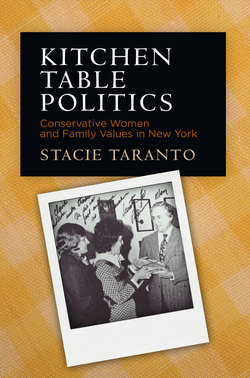Kitchen Table Politics

Реклама. ООО «ЛитРес», ИНН: 7719571260.
Оглавление
Stacie Taranto. Kitchen Table Politics
Отрывок из книги
Kitchen Table Politics
Series Editors: Margot Canaday, Glenda Gilmore,
.....
The women’s story builds upon a distinguished body of work that details how race and the Cold War shaped liberalism’s decline and conservatism’s rise in the decades after World War II. Much of this growth occurred as “kitchen-table activists” worked outside the existing power structure to rid the GOP of its moderate politics.21 Thinking about these concerns alongside gender and women refines our analysis. Sociologists, political scientists, and journalists have done a better job of doing so, although few have focused on ordinary women working at the grassroots level.22
A handful of historians have placed women and gender at the crux of the anticommunist New Right in the fifties and sixties. These works concentrate on America’s Sunbelt region, where such appeals were popular because rising affluence and a Cold War-related economy prevailed there. They describe how middle- and upper-middle-class white women assumed maternal, home-centered identities in the traditionally male public sphere of politics and reform to stymie alleged communist threats. Other women minimized the importance of gender in their anticommunist work, although the fact that they were homemakers with more disposable time to organize shaped their political activism.23 A comparable analysis of the seventies is warranted—a time when feminist-backed changes for women created new targets of conservative ire—particularly a history like this that considers race and ethnicity, religious affiliation, and class alongside women and gender.
.....